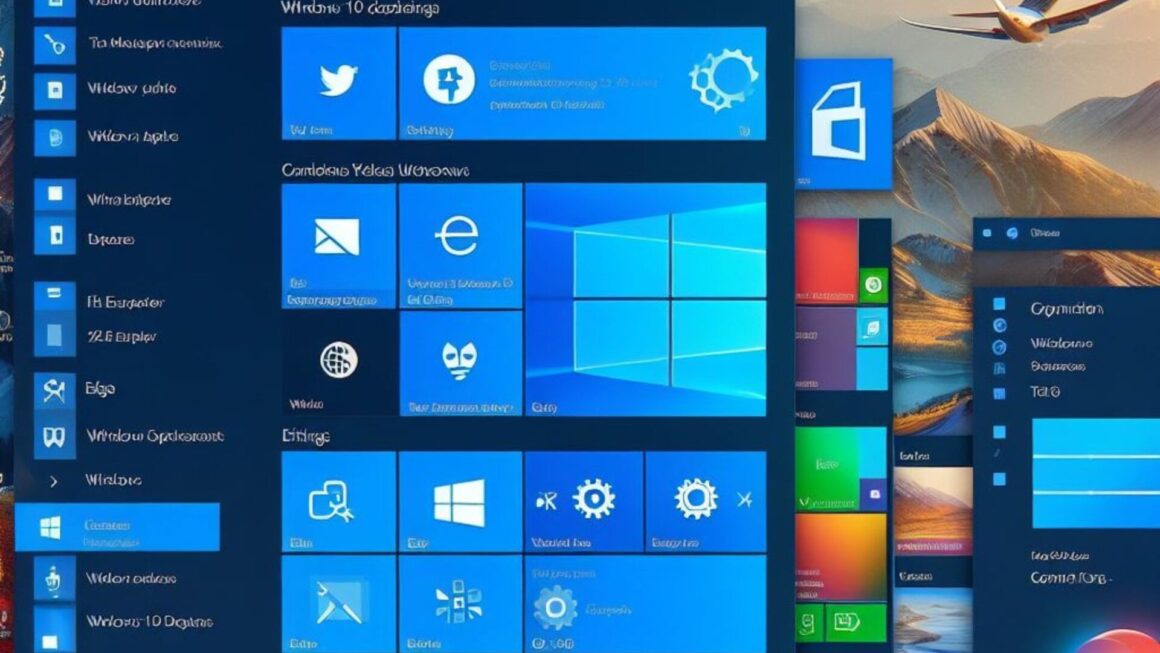Microsoft Azure, a leading cloud service provider, offers a dynamic range of cloud services, enabling businesses to build, manage, and deploy applications on a massive, global network. Initially launched in 2010, Azure has continually evolved, integrating new technologies and expanding its capabilities. It stands out for its seamless integration with other Microsoft products, like Office 365 and Dynamics 365, which makes it an attractive option for many businesses.
What is Microsoft Azure?
Azure is Microsoft’s cloud computing platform, providing a range of services including computing power, storage options, and networking capabilities. It’s designed to help businesses manage challenges and meet their organizational needs. Azure offers solutions like Infrastructure as a Service (IaaS), Platform as a Service (PaaS), and Software as a Service (SaaS) that can be used for services such as analytics, virtual computing, storage, networking, and much more.
The Evolution of Azure
Over the years, Azure has grown significantly, both in terms of services offered and its customer base. The platform initially started with services such as Windows Azure Compute, Windows Azure Storage, and Windows Azure AppFabric. It has since expanded to include a vast array of services that cater to various aspects of cloud computing.

Key developments in Azure’s evolution include:
- Expansion of Services: From initial cloud computing services, Azure has expanded into areas like AI, machine learning, Internet of Things (IoT), and Edge computing.
- Global Reach: Azure’s infrastructure has expanded globally, boasting a large number of data centers around the world. This ensures high availability and redundancy, critical for enterprise-grade applications.
- Integration Capabilities: Azure has enhanced its integration with other Microsoft services and third-party applications, making it a versatile platform for various business needs.
- Commitment to Security: With robust security features and compliance standards, Azure provides a secure environment for enterprises to run their applications.
Microsoft Azure continues to evolve, embracing new technologies and trends in the cloud computing space. Its ability to adapt and introduce innovative solutions has made it a go-to choice for businesses looking to leverage the cloud for their digital transformation.
Latest Advancements in Azure Cloud Services
Microsoft Azure has consistently introduced cutting-edge features and updates, significantly impacting the landscape of cloud computing. These advancements focus on enhancing performance, security, and scalability, ensuring Azure remains at the forefront of cloud service providers.
New Features and Updates in Azure
- Azure AI and Machine Learning: Azure has significantly expanded its AI and machine learning services, allowing for more sophisticated analytics and data processing. This includes Azure Machine Learning, a suite of tools enabling developers to build and deploy AI models rapidly.
- Azure IoT Services: With the rise of the Internet of Things (IoT), Azure has developed services to support IoT applications. This includes Azure IoT Hub, which provides a centralized hub for managing IoT devices, and Azure Sphere, which focuses on securing IoT devices.
- Azure Kubernetes Service (AKS): As containerization becomes more popular, Azure has enhanced AKS, making it easier to deploy and manage containerized applications, thereby streamlining the process of app development and deployment.
- Azure Quantum: Stepping into the realm of quantum computing, Azure Quantum offers a diverse set of quantum services, including quantum hardware and software tools, to explore new computational approaches.
- Azure Hybrid Cloud Solutions: Recognizing the need for hybrid solutions, Azure provides services like Azure Arc and Azure Stack, enabling seamless integration between on-premises datacenters and the Azure cloud.
- Enhanced Security Features: Azure continuously updates its security features, incorporating advanced threat protection and more robust compliance standards to safeguard user data.
- Sustainability Efforts: Azure has been integrating green practices into its operations, aiming to reduce carbon emissions and promote sustainable computing practices.
These developments reflect Azure’s commitment to innovation, offering customers a versatile and future-proof platform. Azure’s ability to integrate these new technologies into its existing ecosystem has made it an invaluable tool for businesses looking to modernize their operations and embrace digital transformation.
Azure AI and Machine Learning Capabilities
Azure Machine Learning stands out as a pivotal service, offering an array of tools for quickly building, training, and deploying machine learning models. This flexibility is further enhanced by support for numerous machine learning frameworks and languages.

Complementing this, Azure Cognitive Services provide APIs that imbue applications with human-like senses. These services include functionalities for vision, speech, language understanding, and decision-making, enabling applications to interact in a more natural and intuitive way.
Azure also excels in creating intelligent, conversational bots through Azure Bot Services. These bots enhance customer engagement across various digital platforms, making interactions more responsive and personalized.
These AI and machine learning services have profound real-world applications. In healthcare, Azure AI is a game changer, assisting in faster and more accurate disease diagnosis by analyzing medical images and patient data. Retail businesses leverage Azure AI to personalize customer experiences and optimize inventory management. In the finance sector, Azure AI plays a critical role in fraud detection, risk management, and automating customer service, analyzing transaction patterns to identify potential fraud and assisting in risk assessment.
Azure’s AI and machine learning services are not just about technological prowess but are tools that empower businesses to innovate and solve complex problems effectively. These services are continually evolving, with new features and capabilities being added to meet the growing demands across various sectors.
By providing these advanced technological solutions in a user-friendly manner, Azure is helping businesses across different industries to enhance their operations, drive efficiency, and foster innovation.
Azure in the World of IoT and Edge Computing
The expansion of Microsoft Azure into the Internet of Things (IoT) and Edge computing is a significant leap forward, offering powerful tools and services for the modern technological landscape.
Azure IoT services, such as the Azure IoT Hub, provide a centralized solution for managing IoT devices. This service simplifies the process of connecting, monitoring, and controlling a vast network of IoT devices, which is crucial in today’s interconnected world. Alongside, Azure Sphere focuses on the security aspect, offering a solution that is specifically designed to secure IoT devices against various threats.
Edge computing is another area where Azure is making strides. The increasing need to process data closer to where it is generated, to reduce latency and improve response times, is well addressed by Azure’s Edge solutions. These services allow data processing on the edge of the network, enabling real-time insights and actions, which is particularly beneficial for industries like manufacturing, retail, and healthcare.
These IoT and Edge computing capabilities are instrumental in driving operational efficiency and enabling new ways of managing data and devices. For example, in manufacturing, Azure IoT and Edge computing can be used to monitor equipment performance in real time, predict maintenance needs, and prevent downtime. In retail, these technologies help in managing inventory more effectively and improving the customer shopping experience through personalized interactions.
Azure’s commitment to IoT and Edge computing illustrates its understanding of the current technological trends and its foresight in preparing for future needs. By integrating these technologies into its cloud services, Azure is not only enhancing its existing offerings but also providing new opportunities for businesses to innovate and grow in the digital era.
Understanding Azure’s Pricing and Cost Optimization
Azure’s pricing and cost optimization features stand out as key aspects, offering businesses flexibility and control over their cloud expenses. The pricing model of Azure is designed to be transparent and predictable, ensuring that businesses only pay for what they use.
Azure Pricing Structure
Azure follows a pay-as-you-go pricing model, which means businesses pay only for the resources they consume. This approach is particularly beneficial for companies with fluctuating needs, as it allows them to scale their resources up or down based on demand, without incurring unnecessary costs.
To further assist in cost management, Azure provides several tools and resources:
- Pricing Calculator: Azure’s pricing calculator helps businesses estimate the costs of Azure products and services before they commit. This tool is invaluable for budget planning and cost prediction.
- Total Cost of Ownership (TCO) Calculator: The TCO calculator is designed to estimate the cost savings when moving to Azure from on-premises or other cloud services. It provides a comprehensive view of the financial impact of adopting Azure.
- Cost Management Tools: Azure offers a suite of tools to help businesses manage and optimize their cloud spending. These tools provide insights into resource usage and spending patterns, enabling businesses to make informed decisions about their cloud investments.
Optimizing Costs in Azure
Cost optimization in Azure is not just about reducing expenses; it’s about maximizing value. Azure provides guidance and best practices on how to manage resources efficiently, ensuring that businesses get the most out of their cloud investment. This includes choosing the right types of services, scaling resources effectively, and using reserved instances for predictable workloads.
Azure’s pricing and cost optimization features reflect its commitment to providing a customer-friendly and economically efficient cloud platform. By offering a range of tools and resources to help businesses manage their cloud spending, Azure ensures that its services are accessible and valuable to businesses of all sizes and types.
Security and Compliance in Azure
Security and compliance are fundamental aspects of Microsoft Azure, emphasizing the importance of safeguarding data and adhering to regulatory standards. Azure’s approach to security encompasses a comprehensive range of features and practices designed to protect data and applications in the cloud.
Azure’s Security Features
Azure’s security framework is built on multiple layers of protection, ensuring that data is secure at all times:
- Advanced Threat Protection: Azure continuously monitors for and defends against potential threats. This proactive stance includes automated tools that detect and mitigate risks.
- Data Encryption: Azure provides robust encryption for data at rest and in transit. This means that data is encrypted when it’s stored and also as it moves across the network, providing a high level of data protection.
- Identity and Access Management: Azure Active Directory (AD) offers identity services that ensure only authorized personnel can access sensitive data and applications. This includes features like multi-factor authentication and conditional access policies.
- Network Security: Azure’s secure network infrastructure includes firewalls, DDoS protection, and private connectivity options. These features help to protect the network perimeter and ensure safe data transmission.
Compliance Standards in Azure
Azure’s compliance with various international and industry-specific standards is a key part of its security framework:
- Global and Local Compliance: Azure meets a broad range of compliance standards, including GDPR, HIPAA, ISO 27001, and many others. This global compliance ensures that businesses across different regions and industries can use Azure while adhering to local and international regulations.
- Regular Audits and Certifications: Azure undergoes regular audits and maintains certifications to ensure ongoing compliance with the latest standards. This commitment to compliance demonstrates Azure’s dedication to maintaining a high level of security and trust.
- Transparency and Trust: Azure offers tools and detailed documentation to help businesses understand and manage their compliance obligations. This transparency is crucial for businesses that need to demonstrate compliance to regulators or stakeholders.
Azure’s comprehensive security and compliance features highlight its commitment to providing a trusted and secure cloud environment. By offering advanced security measures and meeting stringent compliance standards, Azure ensures that businesses can confidently and safely use its services for their critical operations.
Future Trends and Directions for Azure
The future of Microsoft Azure focuses on enhancing AI and machine learning, diving into quantum computing with Azure Quantum, and expanding IoT and Edge computing services. This aligns with a growing emphasis on sustainable cloud computing, utilizing renewable energy sources and helping businesses reduce their carbon footprint. Azure is also expected to further develop its hybrid cloud solutions, like Azure Arc and Azure Stack, to offer more flexibility for businesses. These advancements indicate Azure’s commitment to evolving beyond traditional cloud computing, playing a crucial role in driving innovation and efficiency in various industries. Azure’s role as a dynamic cloud service provider is central to the future of digital transformation and business success.
Conclusion
In the journey through Microsoft Azure’s landscape, we’ve seen how it stands as a robust platform for cloud services and solutions. Azure’s continual evolution, marked by advancements in AI, machine learning, IoT, and Edge computing, demonstrates its commitment to staying at the forefront of technological innovation. The platform’s focus on offering flexible pricing and robust security measures, along with compliance with global standards, highlights its dedication to meeting the diverse needs of businesses.
Looking ahead, Azure’s trajectory towards incorporating cutting-edge technologies like quantum computing and sustainable cloud practices indicates its role in shaping the future of the digital world. The platform’s ability to adapt and integrate these technologies into a comprehensive cloud ecosystem underscores its value as a tool for business growth and digital transformation.
Microsoft Azure, therefore, emerges not just as a cloud service provider but as a key enabler of innovation and efficiency across industries. Its continued focus on advancing cloud technology, coupled with a strong security and compliance framework, positions it as an essential partner for businesses navigating the complexities of the digital era. As Azure evolves, it’s poised to offer more dynamic and transformative solutions, making it an indispensable asset for organizations looking to harness the power of cloud computing.




